You're probably wondering whether the iPhone 12 truly surpasses the Samsung A14 5G in every aspect. While the iPhone 12 boasts a sleek design, exceptional display, and advanced camera capabilities, the Samsung A14 5G offers some compelling features of its own, like a larger battery and more RAM for multitasking. Both devices have their strengths and weaknesses, making the decision far from straightforward. To really understand which one suits your needs better, let's take a closer look at the design, performance, battery life, and other critical factors.
Design and Build Quality
When it comes to design and build quality, the iPhone 12 stands out with its sleek and compact form factor, measuring 71.5 x 146.7 x 7.4 mm and weighing a mere 164 g. This makes it considerably more portable than the bulkier Galaxy A14 5G, which measures 78 x 167.7 x 9.1 mm and weighs 202 g. The iPhone 12's lightweight and slim profile contribute to its ease of use and overall portability, making it an attractive option for users who prioritize convenience.
In terms of materials, the iPhone 12 is crafted with a glass back and an aluminum frame, giving it a premium feel and robust build quality. This contrasts with the Galaxy A14 5G, which does not specify its materials, potentially affecting the perception of its build quality. The use of Gorilla Glass Victus on the iPhone 12 further enhances its durability, providing superior protection against scratches and drops. The Galaxy A14 5G's lack of specified damage-resistant glass may result in greater susceptibility to wear and tear over time.
An important aspect of build quality is the device's resistance to environmental elements. The iPhone 12 boasts an IP68 rating, offering excellent water and dust resistance, which is absent in the Galaxy A14 5G. This rating guarantees that the iPhone 12 can withstand submersion in water up to a certain depth, enhancing its durability in various conditions.
Additionally, the iPhone 12 is available in a range of colors, including Black, Light Green, Dark Red, and Silver, providing more aesthetic options compared to the Galaxy A14 5G. This variety allows users to choose a device that best matches their personal style.
Display and Screen Features
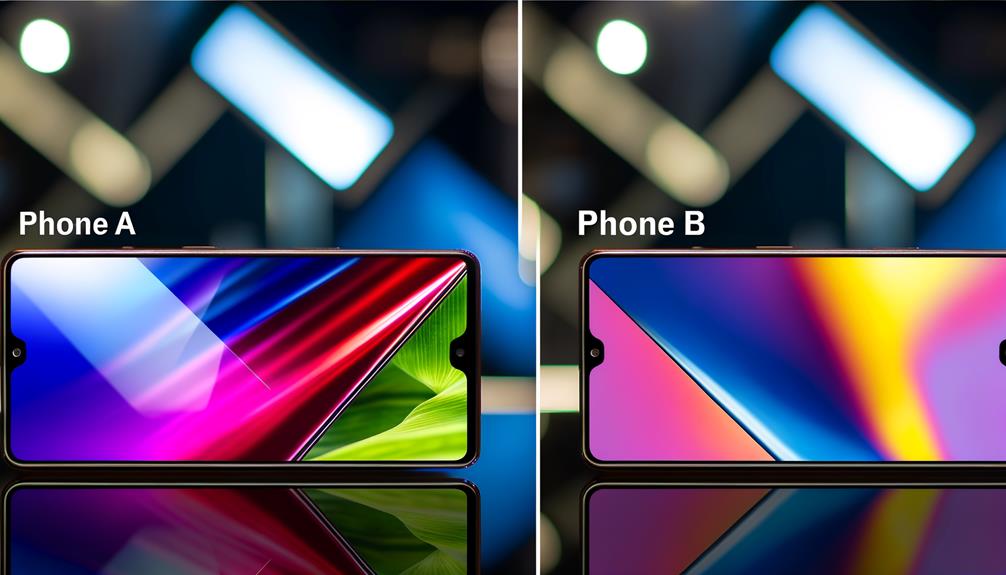
The display and screen features of the iPhone 12 and Samsung Galaxy A14 5G each offer distinct advantages depending on your preferences.
First, let's talk about the display type and resolution. The iPhone 12 boasts a 6.1-inch OLED display with a resolution of 1170 x 2532 pixels, delivering a superior pixel density of 460 ppi. This high pixel density guarantees sharper and more vibrant images. On the other hand, the Galaxy A14 5G has a larger 6.6-inch LCD display with a resolution of 1080 x 2400 pixels and a pixel density of 399 ppi. While still respectable, it doesn't match the iPhone's clarity.
| Feature | iPhone 12 | Samsung Galaxy A14 5G |
|---|---|---|
| Display Type | OLED | LCD |
| Resolution | 1170 x 2532 pixels | 1080 x 2400 pixels |
| Pixel Density | 460 ppi | 399 ppi |
| Brightness | 625 nits | Not specified |
In terms of brightness, the iPhone 12 can reach up to 625 nits, offering better visibility under bright conditions, which is essential for outdoor use. The Galaxy A14 5G doesn't specify its brightness level, potentially leaving you guessing about its performance in direct sunlight.
Both phones have a refresh rate of 60Hz, suitable for everyday use but not ideal for high-speed gaming. However, the Galaxy A14 5G's larger screen size can enhance your media consumption experience, making it great for watching videos or browsing.
The durability factor is notable with the iPhone 12, which uses Gorilla Glass Victus. This provides excellent resistance to scratches and drops, unlike the Galaxy A14 5G, which lacks this feature. Additionally, the iPhone 12's higher screen-to-body ratio of 87.24% versus the Galaxy A14 5G's 80.45% results in a more immersive viewing experience with thinner bezels.
Ultimately, your choice between these two phones will depend on your priorities in display quality, durability, and media consumption needs.
Performance and Speed
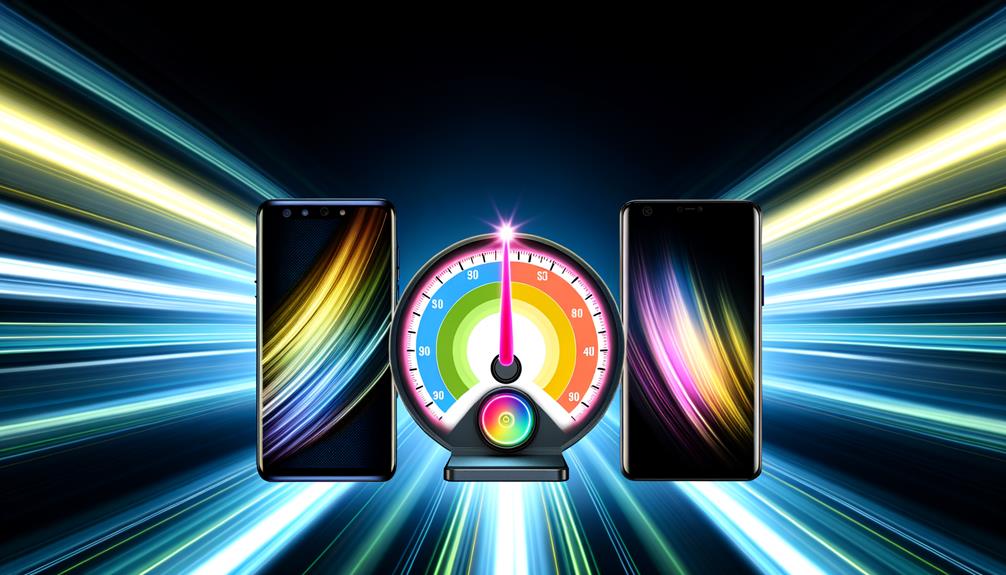
Performance and speed are critical facets that can dramatically impact your overall smartphone experience. When comparing the iPhone 12 and the Samsung Galaxy A14 5G, the iPhone 12 stands out due to its impressive A14 Bionic chip. This chip provides superior performance, evidenced by an AnTuTu benchmark score of 1,083,087, notably higher than the Galaxy A14 5G's 409,771.
In terms of Geekbench 6 tests, the iPhone 12 achieves a multi-core score of 4,413 and a single-core score of 1,995. These scores far exceed the Galaxy A14 5G's scores of 1,001 (multi-core) and 219 (single-core). The A14 Bionic's efficiency and speed are further highlighted in 3DMark benchmark tests, where the iPhone 12 scores 7,601 in the Wild Life test and 2,155 in the Wild Life Extreme test. In contrast, the Galaxy A14 5G only manages to score 1,385 and 366 respectively.
The iPhone 12's performance optimization is not solely reliant on raw benchmarks. Despite having 4GB of RAM compared to the Galaxy A14 5G's 8GB, the iPhone 12 runs iOS efficiently, leveraging its hexa-core CPU, which operates at a maximum clock speed of 3.1 GHz. The Galaxy A14 5G's octa-core CPU, with a maximum clock speed of 2.4 GHz, doesn't match the A14 Bionic's overall speed and efficiency.
Camera and Photography
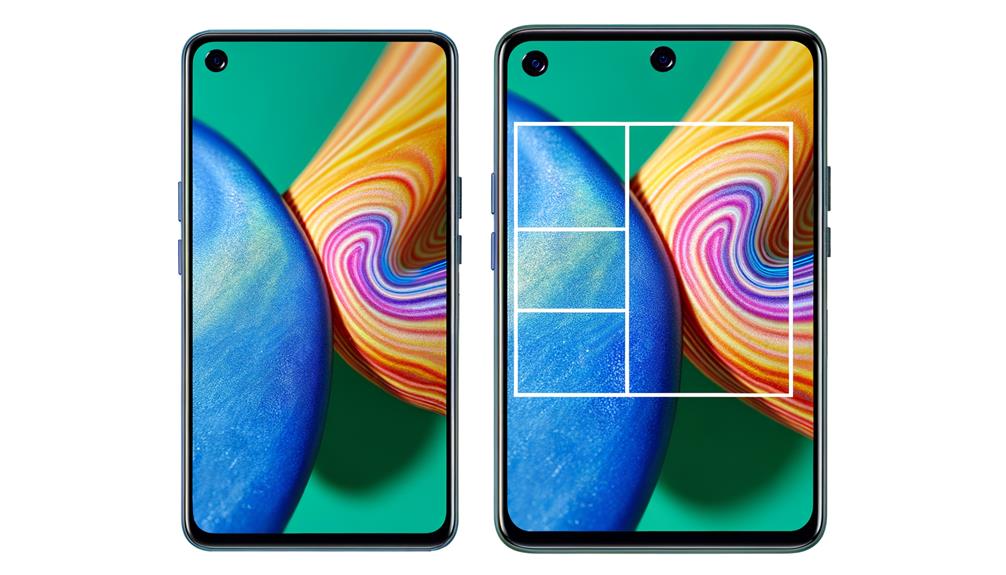
When comparing the camera systems of the iPhone 12 and Samsung Galaxy A14 5G, you'll find distinct differences in both hardware and performance. The iPhone 12's dual 12 MP setup, bolstered by optical image stabilization, often produces better low-light photos compared to the A14 5G's triple camera array, despite its higher 50 MP main sensor. Additionally, video recording on the iPhone 12 is superior, offering 4K at 60fps, while the A14 5G maxes out at 1080p at 30fps.
Main Camera Comparison
While evaluating the main camera capabilities, it's clear that both the iPhone 12 and Samsung Galaxy A14 5G have their unique strengths. The iPhone 12 features a dual rear camera setup with two 12 MP sensors, supported by advanced image processing and software optimization. This combination guarantees high-quality photos with excellent color accuracy and detail. Adding to its advantages, the iPhone 12's main camera includes Optical Image Stabilization (OIS), greatly enhancing photo clarity, particularly in low-light conditions.
In contrast, the Samsung Galaxy A14 5G offers a more versatile triple rear camera configuration, headlined by a 50 MP main sensor. Accompanied by two 2 MP sensors for depth and macro photography, it provides diverse shooting options. However, the lack of OIS in the Galaxy A14 5G could be a drawback for those prioritizing low-light performance.
Additionally, the iPhone 12's f/1.6 aperture allows for better light intake compared to the Galaxy A14 5G's f/1.8 aperture, which can further impact low-light photography. While the Galaxy A14 5G may appeal to those seeking a higher megapixel count and versatility, the iPhone 12 excels in image processing and overall camera stability.
Video Recording Capabilities
In relation to video recording capabilities, the iPhone 12 unmistakably leads with its ability to capture videos in 4K resolution at 60 frames per second, delivering superior video quality compared to the Samsung Galaxy A14 5G, which maxes out at 1080p at 30 frames per second. This higher resolution and frame rate provide you with crisper and more detailed video output, making the iPhone 12 a clear winner for video enthusiasts.
The iPhone 12's Optical Image Stabilization (OIS) greatly enhances video recording by reducing motion blur and providing smoother footage, a feature absent in the Galaxy A14 5G. This makes a noticeable difference, especially in dynamic or low-light environments. Additionally, the iPhone 12 supports HDR video recording, which improves dynamic range and color accuracy, offering richer and more vibrant videos compared to the standard capabilities of the Galaxy A14 5G.
The dual-camera setup on the iPhone 12 allows for versatile video recording options, including wide and ultra-wide lenses, whereas the Galaxy A14 5G's triple-camera arrangement is more tailored to still photography. Even the front camera on the iPhone 12 outperforms, recording in 4K resolution, while the Galaxy A14 5G's front camera remains limited to 1080p. Overall, for video recording, the iPhone 12 offers a more robust and versatile experience.
Battery Life and Charging
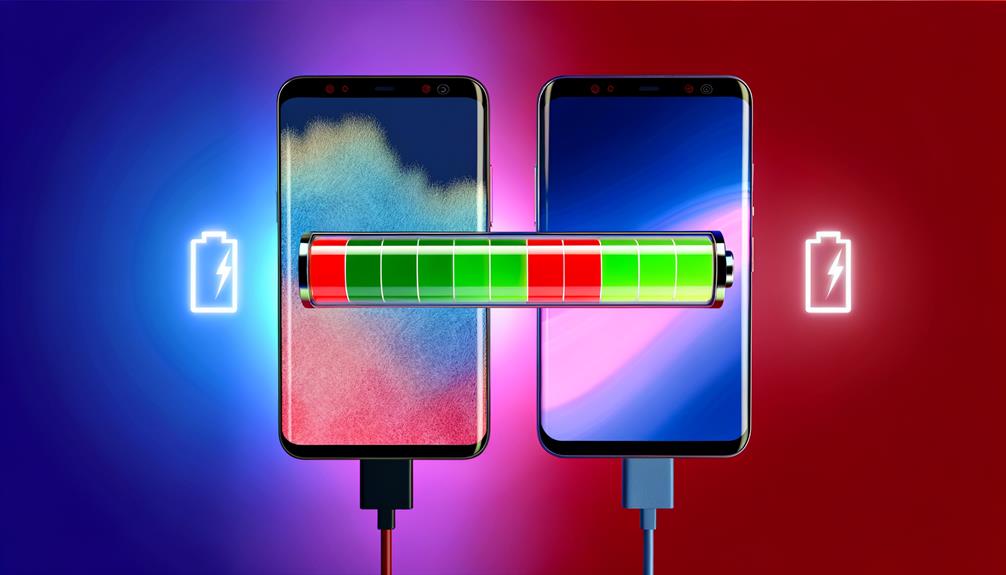
In the domain of battery life and charging, the iPhone 12 and Samsung Galaxy A14 5G offer distinct advantages that cater to different user needs. The iPhone 12 comes with a battery capacity of 2815 mAh, while the Samsung Galaxy A14 5G boasts a larger battery at 5000 mAh. This difference in battery capacity translates directly into more extended usage time for the Galaxy A14 5G, which can be a significant advantage for heavy users or those who prefer fewer charging interruptions.
However, the iPhone 12 compensates for its smaller battery with optimized battery performance, thanks to its efficient A14 Bionic chip. This efficient software integration guarantees that the iPhone 12 can deliver a reliable usage experience despite its smaller battery. On the other hand, the Galaxy A14 5G's larger battery may offer longer overall usage, but it doesn't benefit from the same level of software optimization.
When it comes to charging speed, the iPhone 12 leads with a maximum charging speed of 20W, compared to the Galaxy A14 5G's 15W. This means you'll spend less time tethered to a charger with the iPhone 12. Additionally, the iPhone 12 supports wireless charging at 7.5W through MagSafe and Qi technology, a feature absent in the Galaxy A14 5G. This can add convenience for users who prefer the flexibility of wireless charging.
Both devices use a non-replaceable Li-Ion battery type, but the Galaxy A14 5G's larger capacity offers a clear advantage regarding longevity between charges. Ultimately, your choice may hinge on whether you prioritize a longer battery life or faster, more flexible charging options.
Connectivity and Miscellaneous Features
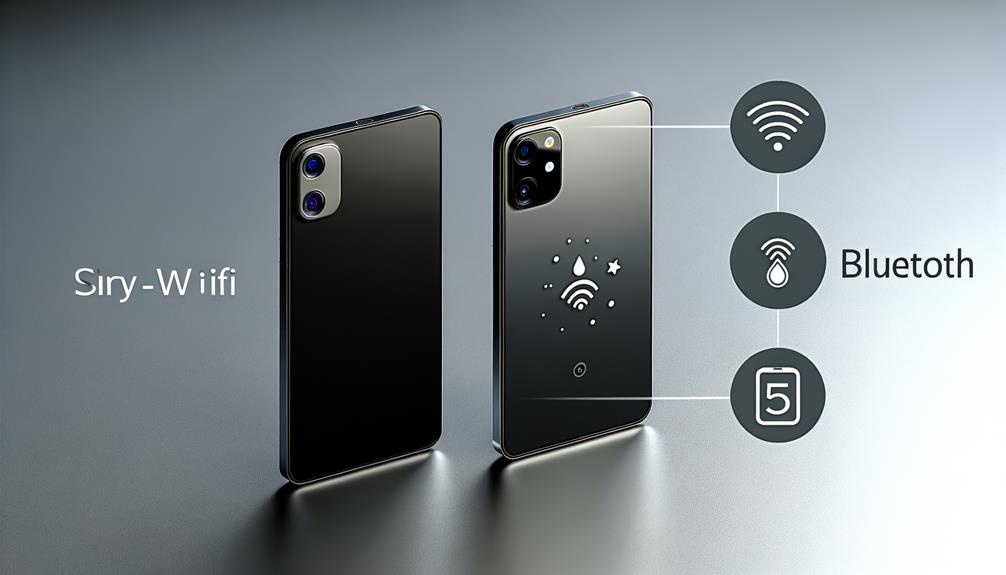
When evaluating connectivity and miscellaneous features, the iPhone 12 and Samsung Galaxy A14 5G each present compelling benefits that cater to various preferences and needs. Both devices support 5G technology, guaranteeing you'll experience fast mobile internet connectivity for seamless browsing, streaming, and downloading.
The iPhone 12 stands out with its support for Wi-Fi 6, offering superior speeds and efficiency compared to the Galaxy A14, which only supports Wi-Fi 4 and 5. This difference is significant if you rely heavily on Wi-Fi for high-bandwidth activities like internet streaming or gaming.
On the charging front, the Galaxy A14 features a USB Type-C port, a widely adopted standard that simplifies connectivity and charging across various devices. In contrast, the iPhone 12 continues to use Apple's proprietary Lightning connector, which might limit interoperability but guarantees a consistent Apple ecosystem experience.
When it comes to biometric security, the iPhone 12 employs Face ID, providing a quick and reliable way to access your phone and authenticate payments. The Galaxy A14, however, includes a fingerprint scanner, offering an alternative that some may find more convenient, especially in situations where facial recognition is less effective.
Here's a quick comparison to help you visualize these differences:
- 5G technology: Both devices support it, guaranteeing fast mobile internet connectivity.
- Wi-Fi 6 vs. Wi-Fi 4 and 5: iPhone 12's Wi-Fi 6 offers better speeds and efficiency.
- USB Type-C vs. Lightning connector: Galaxy A14 uses USB Type-C, while iPhone 12 sticks with the Lightning connector.
- Biometric security: iPhone 12 uses Face ID; Galaxy A14 has a fingerprint scanner.
Both phones lack a built-in FM radio tuner, making internet streaming your go-to for radio access. Overall, each device's connectivity and miscellaneous features cater to different user preferences and ecosystem integrations.
Frequently Asked Questions
Is Samsung 5G Better Than Iphone?
You're comparing Samsung performance with iPhone durability. Both offer 5G availability, but Samsung's camera and battery excel. The iPhone's ecosystem, software, and 5G speed are superior. Samsung design is modern, but iPhone's overall experience is seamless.
Is It Better to Buy Iphone 12 or 14?
When deciding between the iPhone 12 and 14, consider the iPhone features comparison, camera quality differences, and software ecosystem analysis. Evaluate battery performance, price value, user experience feedback, brand loyalty, longevity, and resale value trends.
Is the Samsung Galaxy A14 5G Good or Bad?
You'll find the Samsung Galaxy A14 5G offers solid performance, excellent camera quality, and impressive battery life. With a user-friendly interface, decent design aesthetics, and competitive price, it's a good choice, considering upgrade options and longevity expectations.
Is Iphone 14 5G Faster Than Iphone 12?
When comparing iPhone performance, the iPhone 14 5G is faster than the iPhone 12. Enhanced A15 chip, better graphics, improved camera capabilities, and optimized software contribute to superior user experience, gaming performance, and network connectivity, ensuring better value for money.
Conclusion
In comparing the iPhone 12 and Samsung A14 5G, it's clear that the iPhone 12 excels in design, display, and camera performance due to its premium build, OLED screen, and advanced camera system. The A14 5G, with its larger battery and RAM, may suit users focused on longevity and multitasking. Ultimately, your choice hinges on whether you prioritize refined user experience and performance over battery life and multitasking capabilities. Both devices offer distinct advantages tailored to different needs.
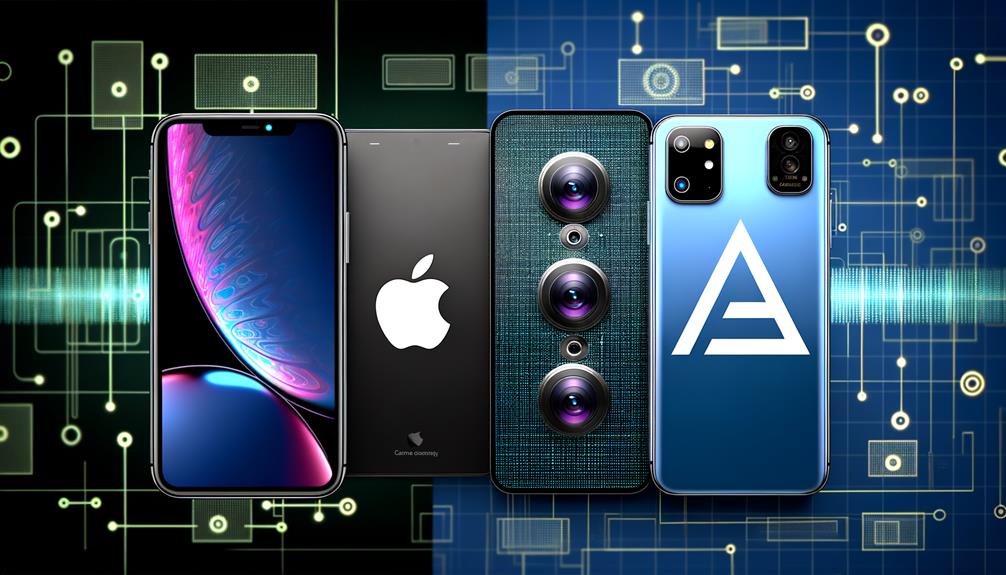


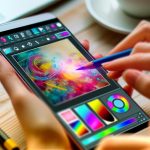
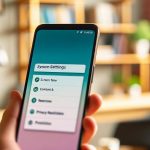
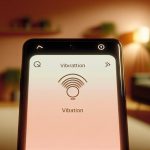
Leave a Reply